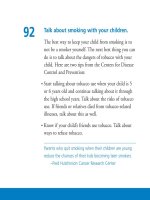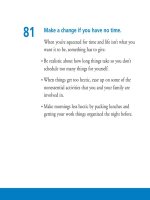Feeling good 100 ways to feel better every day phần 7 pps
Bạn đang xem bản rút gọn của tài liệu. Xem và tải ngay bản đầy đủ của tài liệu tại đây (88.88 KB, 11 trang )
Use your break to feel good.
Breaks are good for you, especially if you take
advantage of your break to do healthy things.
• Get up out of your chair. Stand up and stretch in
your work area. Take a walk down the hall if you’re
able to leave your area.
• Share a joke or funny story with a co-worker.
• Take a break from what you are doing if you’re feeling
frustrated or blocked with a project or task. Come
back to it after a short break.
• Get some fresh air on your break if you can.
71
Help your child feel good.
The American Heart Association recommends that
children and teenagers get at least 60 minutes of
moderate to vigorous physical activity every day.
Help your child feel good by being a physically active
parent. Take family walks, hikes, and bicycle rides
together. Play tag or softball together as a family.
Limit your child’s computer and TV time. Walk to
school with your child. Have your child come with
you to walk the dog. Take part in a fitness charity
event with relatives and friends. Make your next
family vacation an active one.
In a survey by the American Obesity Association, 24
percent of parents said their children are less physically
active than they were as children.
72
Protect your body when playing sports.
Here are three tips for adults and children:
• Use recommended protective gear. Wear a helmet that
fits snugly when bicycling, skating, snowboarding,
skiing, and scooting. Make sure your child always wears
recommended safety equipment such as wrist guards,
kneepads, and a mouth guard when playing sports.
• Always take 5 to 10 minutes to warm up and stretch
before and after physical activity. Hold stretches for at
least 10 to 30 seconds. Encourage your child to
stretch, too, before sports practice and games.
• Don’t overdo it. Too much exercise can be as bad as
too little exercise.
According to government figures, baby boomers riding
bicycles die from head injuries at nearly twice the rate as
children riding bicycles because they aren’t wearing helmets.
73
If worries are keeping you awake, get help.
Stress keeps millions of people from sleeping well at
night. Family matters, work, and money are the top
three things people worry about most, according to a
recent survey by the Better Sleep Council. If worries
are keeping you awake, talk with your doctor about
your sleep problems. Some symptoms of stress can
also be indications of depression or other conditions.
Check with your physician if you are concerned about
any aspect of your health.
Tip: Keep a pad of paper and a pen beside your bed. If you
wake up at night with an important thought, write it down.
You will be able to go back to sleep more easily knowing
that your idea will be there for you in the morning.
74
Make soup.
Chicken soup has been called everything from “flu
therapy” to sustenance for the soul. Here’s a good
recipe you can make in under an hour.
Ingredients: 6 cups of chicken broth that’s not too
salty; 1 lb. skinless, boneless chicken breasts; 1
tablespoon oil; 1 medium onion, chopped; 2 medium
carrots, cut diagonally into slices; 2 celery ribs, cut
into slices; salt and pepper; 3 tablespoons finely
chopped fresh parsley.
Cook chicken in broth. Bring to a boil. Skim surface
and simmer for 30 minutes. Transfer chicken to a plate.
Shred when cool. While chicken is cooking, sauté
onion in oil in a soup pot over moderate heat until
softened. Add carrots, celery, salt, and pepper. Cook
about 8 minutes. Add cooking broth and simmer,
covered, until vegetables are tender, about 10 minutes.
Stir chicken and parsley into soup and serve. Serves 4.
75
Treat yourself to an activity you enjoy or to an adult
education class. It can be satisfying to learn something
new and to spend time on something that engages
you. It can also be a way to take your mind off your
worries and meet new people who share your interests.
• What activities do you enjoy in your free time? What
topics interest you in your reading or on TV? Those
might be clues to what you’d like to learn more about.
• Think about hobbies or pastimes you had in the past.
Might you pick one of them up again?
• Contact your local high school, community college,
or library to find adult education or skills training
courses in your community.
76
Recognize and deal with angry feelings.
It’s normal to feel angry from time to time. But when
we don’t channel those feelings productively, they can
spill over into other aspects of our life.
• Know the warning signs of anger in yourself so that
you’re able to control and manage your anger. These
include feeling frustrated, irritated, or annoyed;
clenching your fists; or muscle tension, especially in
your neck, back, or jaw.
• Take a slow, deep breath when you find yourself
getting angry. Count to five. Exhale. Repeat.
• Address problems early on so that they don’t worsen
and become harder to resolve.
• If you could use help managing angry feelings, or if
you are living with a person who gets angry often,
speak with your physician, a leader from your faith
community, or contact your EAP.
77
Make time for you.
We all need time alone and time with people. Alone
time is good for your body and soul—it’s a time to
relax, reflect, and think about life and your day. It’s a
time to clear your head and be quiet with yourself.
• Try to spend some time alone every day. Quiet time
alone allows you to tune in to the present moment.
• Spend your time alone doing something you enjoy,
such as reading, taking a bath, or being outdoors.
• Don’t feel guilty about relaxing. It’s OK to just sit in a
comfortable chair and unwind after a busy day.
78
Get help for depression.
About 10 percent of people suffer from depression.
Common symptoms of depression include over-
whelming sadness; feelings of hopelessness; an
inability to concentrate; fatigue; changes in eating
or sleeping habits; loss of interest in activities once
enjoyed, including sex; persistent physical ailments
such as headaches, digestive disorders, and chronic
pain; and thoughts of death or suicide.
Depression is highly treatable. Talk with your health
care provider or your EAP if you have concerns. If
you have thoughts of death or suicide, seek help
immediately.
You can take a confidential depression screening test
at the National Mental Health Association Web site at
www.depressionscreening.org.
79
80
Know the signs of depression in children.
Children and teenagers can experience depression just
as adults can. The signs of depression in children and
teenagers include being angry or irritable, overeating
or not eating enough, having trouble sleeping or
sleeping too much, difficulty concentrating, loss of
energy or low motivation, feelings of sadness, crying
more than usual, headaches, stomachaches, lack of
interest in playing with friends, frequent absences from
school or poor performance in school, drug or alcohol
abuse, or thoughts of death or suicide. Look for
behaviors that are out of the ordinary. For example,
missing money can be a sign that a teenager is stealing
to buy alcohol or drugs.
If you see signs of depression, talk with your child,
listen carefully, and get professional help. Depression
is treatable. Your health care provider, school
counselor, or EAP can help you find a counselor
or therapist.









